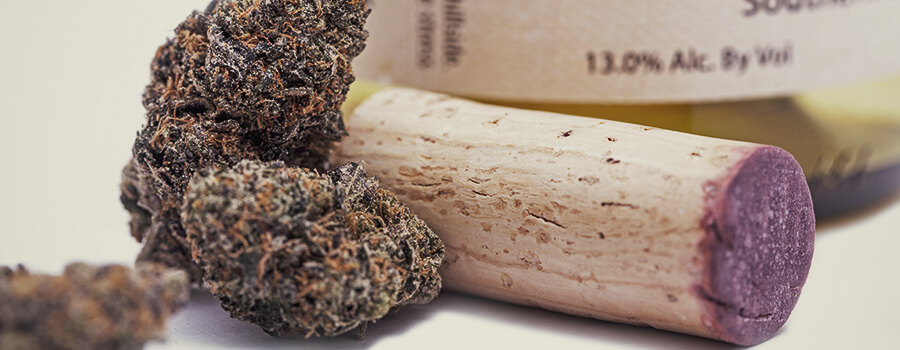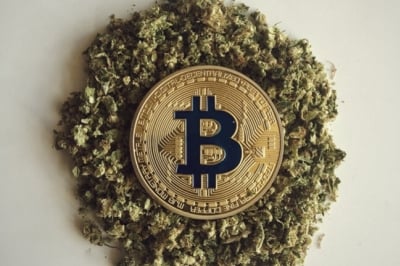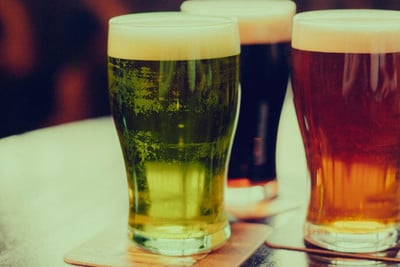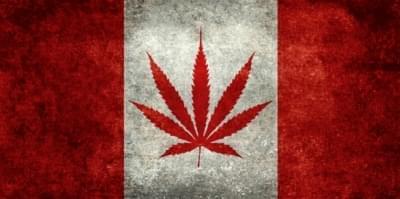.

The Rise Of Cannabis And What It Means For Alcohol Industry
It looks like things are changing. After decades of dominance under cannabis prohibition, alcohol is finally facing a competitor in the legal cannabis market. Are they up for the competition? Or will they reach out and collaborate?
As Simpsons bartender Moe Szyslak once said, "Increased job satisfaction and family togetherness are poison for a purveyor of mind-numbing intoxicants like myself." Here in the 21st century, marriage rates have declined and job insecurity is widespread, so you would think it is a prime market for alcohol. But there is new competition facing the alcohol industry in the mind-expanding form of cannabis. Cannabis is an appealing alternative to alcohol for many. Now that cannabis legalisation is spreading, how will this impact the alcohol industry?
WHY ARE PEOPLE SWITCHING TO CANNABIS?
Cannabis has fewer adverse health consequences than alcohol. It is even prescribed to treat certain medical conditions in more and more parts of the world. The impact it typically has is either mellowing or an energetic uplift of enthusiasm. Alcohol can trigger all sorts of emotional reactions from its lowering of inhibition. It can even make alcohol users unsafe. Even from a socialising standpoint, this contrast was highlighted in the **historic campaign to legalise cannabis in Colorado[1]. It is a bizarre double-standard for cannabis prohibition to have continued so long while alcohol use was widespread. Bill Hicks was pointing this out with his trademark clarity years ago.
COMPETING WITH CANNABIS
With more and more jurisdictions realizing the folly of cannabis prohibition, the legal status of cannabis is being reformed in many places. However, this industry is in its early stages of mainstream acceptance. Many banks and stock exchanges won't process cannabis industry finance because of legal gray areas. This leaves most cannabis businesses dealing in cash or cryptocurrencies. Although cannabis has yet to be normalised, there is already huge investment going into it, with more waiting on the sidelines ready to pounce when it comes out of this gray area.
This year, Canada will become the second nation to legalise the recreational cannabis products. The Canadian bank CIBC predicts that within two short years, the Canadian cannabis industry will be worth $6.5 billion. By contrast, Canadians spent $5.1 billion on liquor in 2017. Cannabis is going to have a huge advantage over alcohol in the coming years. We're all used to alcohol products. The innovations awaiting us from all this investment in the cannabis industry will be novel. Cannabis also has a lot more application than alcohol, which focuses on recreational use. Cannabis has a recreational market, but also other markets such as medical, construction, textiles, agriculture, and food.
To add to the above, alcohol consumption may even be in decline. A 2014 study in the Washington Post reported that 30% of Americans only drink alcohol on special occasions. Another 30% don't drink at all, due to a range of factors such as more health awareness, less disposable income and religious reasons. The rise of legal cannabis, especially in the years since, could be another significant factor. The University of Connecticut and the State University of Georgia published a study on how sales of alcohol and cannabis compared[2] in regions where medical cannabis was available. They found that alcohol sales declined by 13% between 2006 and 2015 in these regions. It suggests that people switch away from alcohol when cannabis is available, which is likely to be exacerbated by the legalisation of recreational marijuana.
ALCOHOL AND CANNABIS WORKING TOGETHER?
So what can the alcohol industry do? The alcohol industry will always thrive, but there is a real risk of their market share reducing. Most jurisdictions that allow some form of cannabis sales strictly separate it from alcohol sales. The Canadian province of Newfoundland & Labrador may break with this trend, allowing cannabis sales in the same grocery stores where liquor is sold. This would make cannabis much more accessible, without customers having to go out of their way to specialized stores to obtain cannabis. They can quite literally decide between cannabis and alcohol in-store.
The alcohol industry will have to market in a way that reinforces positive associations with alcohol. This could be said of pretty much any business. The problem facing alcohol is that the US Centers for Disease Control and Prevention report over 90,000 deaths a year where alcohol use was a factor. The alcohol industry has never really been confronted with its role in poorer health the way the tobacco industry has been. That being said, people do seem more conscious of its negative health consequences now.
The best option the alcohol industry currently has is to get involved with cannabis themselves, and they know it. The possibility of alcohol industry collaboration with canna-business is already being realized. Molson Coors are investing in Canadian cultivators Aurora Cannabis. Constellation Brands, who own Corona, has a minority stake in Canopy Growth, estimated to be worth 6.6 billion US dollars or 8.8 billion Canadian dollars. The alcohol industry may even bring its marketing acumen to help sell the 'experience' of cannabis. The cannabis industry in return, is already supporting the development of cannabis-infused craft beers. It is likely that large cannabis-brand beers will become a norm in the future if the current trend of investment is anything to go by.

HOW TO REGULATE CANNABIS
So, despite it looking like cannabis could be a real threat to the alcohol industry, both are already adapting to not just co-exist but have their industries work together. This could be a cause of concern for some cannabis activists. Already in Canada, their reforms have been criticised by prominent activist and entrepreneur Marc Emery. Addressing the 2018 4/20 Rally in Dublin, Ireland, Emery said: "they betrayed me with that word 'legalisation'". He argued that Canada's regulations give too much power to monopolies and the government. A repeat of the aggressive commercialisation that happened with the alcohol industry is something feared by some advocates and opponents of legal cannabis alike.
That being said, a craft beer scene is flourishing despite the market dominance of big brands. Many cannabis cultivators will remain committed to producing high-quality cannabis. Emery raises a valid point in that how you regulate cannabis will affect so much about the industry and its social impact. Jurisdictions like Uruguay and Catalonia have opted for cannabis access through non-profit members-only cannabis clubs. Other places that are more capitalistic, like the United States, may indeed see the rise of "Big Cannabis". As more countries experiment with different models, the outcome appears to be the same. The alcohol industry will face stiff competition, but it looks like adaption is already underway.
- Arizona https://www.mpp.org
- Marijuana and Alcohol Evidence Using Border Analysis and Retail Sales Data by Michele Baggio, Alberto Chong, Sungoh Kwon :: SSRN https://papers.ssrn.com












































